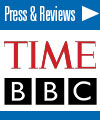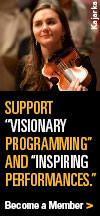May 2013
An Explosive Finale to One World Symphony’s Season
by Alan Young, Lucid Culture
 “When’s the last time you went to a symphonic concert and looked at the program and didn’t see a single date of death?” conductor Sung Jin Hong asked the Chelsea crowd assembled at One World Symphony’s concluding concert of the 2013 season this past May 20. Hong had a good point: it’s not often that an established full-size orchestra programs a whole bill of living composers. Hong designed this one to go out on an explosive note and succeeded spectacularly. While he didn’t address the concert’s politically charged content, the program did: “American Affairs: Great • Atomic • Desire.”
“When’s the last time you went to a symphonic concert and looked at the program and didn’t see a single date of death?” conductor Sung Jin Hong asked the Chelsea crowd assembled at One World Symphony’s concluding concert of the 2013 season this past May 20. Hong had a good point: it’s not often that an established full-size orchestra programs a whole bill of living composers. Hong designed this one to go out on an explosive note and succeeded spectacularly. While he didn’t address the concert’s politically charged content, the program did: “American Affairs: Great • Atomic • Desire.”
This orchestra is known for surprises, and there were a couple early on that raised the bar almost impossibly high for the rest of the bill. Mezzo-soprano Adrienne Metzinger went deep into noir cabaret mode for a lurid take of Benjamin Britten’s Funeral Blues, backed with a stalker’s intensity by pianist Gulnara Mitzanova and the orchestra’s first chair bassist, Justin Lee. Soprano Sonya Headlam had a hard act to follow, but ended up raising the roof with a spine-tingling take of Gershwin’s Summertime, the orchestra lush and balmy behind her as she went to the top of her register, adding a tingling mix of overtones and blues as she brought the song to redline with a triumphant crescendo.
Spring-loaded, catlike and looking somewhat feral on the podium, Hong ran the rest of the concert as a suite — he has a Leonard Bernstein-like aptitude for making connections between what at first glance might seem like completely unrelated pieces. Over the evocative, bittersweetly orchestrated ragtime of John Harbison’s The Great Gatsby, Headlam continued with a more subtly vivid song, Where Is the Old Warm World, F. Scott Fitzgerald’s doomed Daisy offering some wistful foreshadowing. Mezzo-soprano Eva Sun then gave voice to the character Myrtle’s plaintive ache as the backdrop grew more contemplatively atmospheric.
Soprano Ashley Becker aired out the moody intensity of two songs from Andre Previn’s score to A Streetcar Named Desire: the uneasy Sea Air, and a sultry take of I Want Magic. From there they segued into two selections from John Adams’ chilling Robert Oppenheimer-inspired Doctor Atomic, Mitzanova returning for a broodingly opaque turn in front of the orchestra singing Am I In Your Light, the atomic scientist’s wife’s lament.
Baritone Douglas Jabara got the most spectacular of the vocal numbers and made the most of it with a gut-wrenchingly intense, anguished take of Batter My Heart, channeling what the composer felt to be Oppenheimer’s dread for the death and destruction his invention was about to cause (and for his legacy no less, it seems) via text from John Donne’s Holy Sonnet XIV. Offstage before the concert, Jabara said that he believed that Oppenheimer knew the sonnet, and he sang it with that kind of bitter certitude, dashing offstage with a dramatic self-effacement as it ended. From there the orchestra took the Bernard Herrmann-esque horror to a logical, shattering conclusion via a bridge written by Hong as a show-stopping percussion feature with the timpani, tam-tam, and bass drum exploding and then lingering in a firestorm of waves for what seemed minutes on end. It captured the catastrophic horror of the explosion over Hiroshima, not to mention the horrific loss of civilian life, more evocatively than words could possibly have expressed.
Hong programmed the world premiere of his own Edge immediately afterward, a bold and potentially suicidal choice given the previous work’s pyrotechnics. That the conductor’s equally haunting narrative — a setting of Sylvia Plath’s final poem, loaded with vengeful Medea references — wasn’t anticlimactic speaks to its power, and the orchestra’s commitment to it. Soprano Sara Paar had only been given a week to learn it, Hong told the crowd, but she brought it to life with a clenched-teeth, angst-fueled focus against shivery layers of glissandos from the strings. Even when the work lightened toward the end — Plath wasn’t going to kill her kids after all — the mortally wounded atmopshere lingered. Few orchestras would take such a gamble by ending their season on such a dark note; then again, this ensemble has no fear of taking chances.





